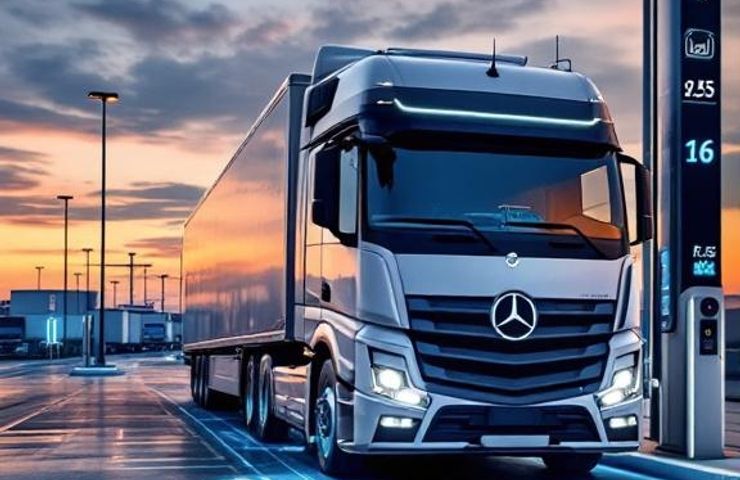
Hydrogen Fuel Cells: Daimler Truck Launches 2nd-Phase GenH2 Trials in Germany
November 18, 2025If you’ve ever wondered what it takes to decarbonize long-haul trucking, all you need to do is watch Daimler Truck. On 13 November 2025, they kicked off Phase Two of real-world customer trials for the Mercedes-Benz GenH2 hydrogen fuel-cell trucks, sending five rigs into daily service along Germany’s busiest logistics routes. The goal? Gather the hands-on data that will guide this zero-emission technology into series production.
Trial Launch & Scope
This second phase picks up where the 2023 tests left off, putting GenH2 trucks in the hands of five new partners on routes covering:
- Baden-Württemberg, Hesse and North Rhine-Westphalia—three freight-intensive states.
- The corridor between Woerth am Rhein (home to Daimler’s main truck plant and a liquid hydrogen station) and Duisburg’s inland port.
- Specialized runs: refrigerated goods, building materials and pharmaceuticals.
Each GenH2 cab hooks up to trailers like electric refrigeration units, so they’re road-testing zero-emission technology across a real variety of payloads.
Origins & Evolution
Daimler Truck’s hydrogen story reaches back to the early 2010s and really kicked into high gear after the Paris Agreement. The first GenH2 prototype rolled out in 2020, and by 2023 those trucks had chalked up over 225,000 km, proving hydrogen fuel cells can handle heavy-duty work. Now, five customer fleets will push these updated rigs through everyday operations.
Sector-Specific Pilots
For Phase Two, the lineup includes:
- DHL Supply Chain—zero-emission refrigerated logistics across Western and Southern Germany.
- Hornbach—building materials runs in consumer retail networks.
- Reber Logistik—temperature-controlled regional freight.
- Teva Germany / ratiopharm—sensitive pharmaceutical transport.
- Rhenus—global logistics services testing sustainable fleet solutions.
Tech Deep Dive: GenH2 & Cellcentric
At its core, the Mercedes-Benz GenH2 Truck uses a Cellcentric PEM fuel-cell stack paired with a small buffer battery. Key specs:
- Liquid hydrogen storage for high volumetric energy density.
- Up to 300 kW continuous output, feeding electric motors with instant torque.
- Regenerative braking that captures energy and boosts efficiency.
- 10–15 minute refuels at dedicated liquid H2 stations.
Ranges exceeding 1,000 km per fill let these trucks rival diesel on even the longest legs.
Performance to Date
Data from 2023–25 shows GenH2 prototypes racked up over 225,000 km while sipping 5.6–8.0 kg of hydrogen per 100 km and hauling 16–34 tons, proving hydrogen fuel cells hold up under real-world loads.
Infrastructure Bottlenecks
Tech’s solid, but hydrogen infrastructure needs to catch up. Today, Germany has liquid H2 stations only at Woerth am Rhein and Duisburg, which restricts route planning. Daimler plans a 100-unit GenH2 run in 2026, but mass adoption probably won’t land until the early 2030s, once refueling networks and supply chains mature.
Strategic & Business Implications
Daimler’s dual strategy—battery-electric for short hops and fuel-cell trucks for the long haul—keeps fleets ahead in zero-emission technology. Key takeaways:
- Diesel-matching payload and daily range.
- Refuel speeds on par with conventional trucks.
- Projected TCO parity by decade’s end as green hydrogen costs fall.
- Real-world data to refine sales, service and network planning.
Collateral Impacts
These trials aren’t just about trucks—they’re laying the groundwork for beefed-up hydrogen infrastructure across Europe, sparking partnerships between OEMs, logistics providers and energy suppliers, and highlighting challenges like high upfront costs, sparse station networks and supply risks. Early adopters shoulder the cost now but clear the path for wider deployment later.
Looking Forward
Watch for new refueling sites, GenH2 small-series rollouts and cost comparisons with battery-electric versus diesel fleets. If those refueling hurdles get cleared, hydrogen fuel cell trucks could anchor industrial decarbonization by the early 2030s. For now, Daimler Truck’s GenH2 trials mark one of the clearest steps toward a zero-emission future for long-haul freight.



 With over 15 years of reporting hydrogen news, we are your premier source for the latest updates and insights in hydrogen and renewable energy.
With over 15 years of reporting hydrogen news, we are your premier source for the latest updates and insights in hydrogen and renewable energy.